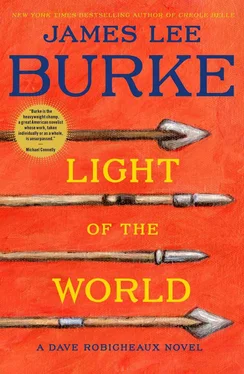She drifted off to sleep as the plane bounced under her, the rain spidering and flattening on the glass. When she awoke, they had just popped out of the clouds, and she saw the sharp gray peaks of mountains directly below her. They made her think of sharks clustered inside a giant saltwater pool with no bottom. “Who was that guy this morning?” Percy said.
“Which guy?”
“The one who dropped you at the airport.”
“There wasn’t any guy. I drove myself. My pickup is parked in the lot.”
“There was an older man in the waiting room. I thought maybe he was your father, the way he was looking at you.”
“No,” she said. “My father is probably still asleep at Albert Hollister’s ranch. What did he look like?”
“Long face, high forehead. I don’t remember. Can you get the thermos for me?”
“Think hard, Percy.”
He shook his head. “I don’t remember. Just a guy, about fifty-five or so. Older guys never look at you?”
“I scare them away.”
“ You? That’s a laugh.”
“You said I was the real thing. That’s kind of you, but you’re assigning me a virtue I don’t have. I love movies. I’ve loved them all my life. I never knew why until I read an interview with Dennis Hopper. He grew up poor in a little place outside Dodge City, Kansas. All he remembered of Dodge City was the heat and the smell of the feeder lots. Every Saturday he went to town with his grandmother and sold eggs. She gave him part of the egg money to go to a cowboy movie. Hopper said the movie theater became the real world and Dodge City became the imaginary one. When he was in his teens, he went out to Hollywood. His first role was in Rebel Without a Cause, with James Dean. His second movie was Giant, with James Dean again. Not bad, huh?”
“People like you.”
“What?”
“The Sierra Club people like you.” Percy leaned forward, seeming to stare at a point beyond the starboard wing. “Check out the Cessna at three o’clock.”
“What about it?”
“He’s been with us awhile. Is anybody following you around?” His eyes crinkled.
“Maybe I upset a few people in Florida and Louisiana.”
“You’ll never make the cut as a villain, Gretchen. Here comes the Cessna. I didn’t tell you I used to drop fire retardant for the United States Forest Service. Let’s go down on the deck and see if he wants to stay with us.”
They had just flown through clouds above a mountain peak into sunlight and wide vistas of patchwork wheat and cattle land. Percy took the twin-engine down the mountain’s slope like a solitary leaf gliding on the wind, the plane’s shadow racing across the tips of the trees. Gretchen felt as though she were dropping through an elevator shaft. Percy leveled out at the base of the mountain and began to gain altitude again, the engines straining, a barn and a white ranch house couched inside poplar trees miniaturizing as Gretchen looked out the window. “Where’d that red Cessna go?” Percy said.
“I don’t know. Just don’t do that again,” she said.
“Everything’s cool,” he replied. He touched a religious medal that hung from a chain on his instrument panel. “What can go wrong when you have Saint Christopher with you?”
“I don’t find your attitude reassuring,” she said.
They flew along the edges of the Grand Divide and Glacier National Park, where the flat plains seemed to collide with the mountains. On the western end of the Blackfoot Reservation, Gretchen saw several test wells, one close to the border of the park. The plane climbed higher into the mountains and made a wide turn over Marias Pass. She could see snow packed inside the trees on the crests and the slopes, and deep down in the canyon, an emerald river that wound through boulders that were as big as houses.
She pulled open her window. “Get down as close as you can,” she said.
“What are you doing?”
“Filming. That’s why we’re here.”
“You want to fly through that canyon?”
“You’ve got to do something for kicks.”
He blew out his breath. “I underestimated you,” he said.
You can say that again, she thought.
He made another turn and headed straight at Marias Pass, dropping lower and lower, the trees standing out individually on the peaks, snow melting on rocks, a train trestle glinting above a gorge, Gretchen hanging out the window with her camera, her hair whipping in the wind.
Her face and hands were cold, her shirt was ballooning, her ears were deafened by the wind stream and the roar of the engines. None of that mattered. Through the lens of the camera, she was capturing topography whose geological age could only be guessed at. Even when the train trestle sped by and she could smell the trees and the coldness of the snow down below and see a canyon wall approaching the plane, she never took her eye from the lens.
She felt the plane lift violently, the engines shuddering, the wings stressing, as Percy took them along the edge of a cliff and over a mountain crest where the tips of the Douglas fir were probably no more than ten feet below the plane’s belly. Percy turned in to the sun and flew toward the plains, his hands opening and closing on the yoke. She sat back down in the seat and shut the window. “Thanks,” she said.
“Thanks?”
“Yeah, that was very nice of you.”
“We came within about three seconds of pancaking into that cliff. Where have I heard that line ‘You’ve got to do something for kicks’?”
“Rebel Without a Cause.”
He smiled, his expression like a young boy’s. “You ever read a biography of Ernest Hemingway?”
“Probably not.”
“He used to say his third wife, Martha Gellhorn, had legs that were six feet long. That’s what you look like, Gretchen. You’re the most beautiful woman I’ve ever seen. On top of it, you’re a beautiful person.”
“Maybe there are some things you don’t know about me. Maybe you shouldn’t be telling me about your feelings.”
“Gay guys hit on you all the time?”
“You’re gay?”
“What did you think I am?”
“A gorgeous man.” She got up on her knees and put her hand on the back of his neck and kissed him on the cheek. Then she did it again.
“Jesus Christ, Gretchen.”
“What?”
“Cut it out or I’ll have to stop being gay,” he said.
They landed on the rez at an airstrip mowed out of a pasture, a windsock at the far end straightening in the breeze. The sky was full of dust and pollen and chaff blowing from a field where a farmer was harrowing. It was a bleak place devoid of trees or shade, the ground studded with rocks, and tangles of mustard weed were bouncing across it like jackrabbits. At the crossroads was a general store with two gas pumps in front and a collapsed barn in back. One of the pumps had been vandalized and was powdered with rust. Gretchen looked at the sign over the door. It said DEER HEART ONE STOP.
“You’ve been here before?” she said.
“A couple of times. To gas up and hire a driver.”
“Deer Heart was the name of a teenage girl who was murdered outside Missoula. She was the adopted granddaughter of Love Younger.”
“That bastard adopts Indian kids?”
“His son did. The one called Caspian.”
“These people have enough trouble without the Youngers taking their kids. I wonder if there’s a curse on this country. You ever hear of the Baker Massacre?”
“No.”
“In 1870 an alcoholic army major by the name of Eugene Baker murdered two hundred and seventy Piegan Blackfeet up on the Marias River. Most of them were women and children. It was January, and the survivors were driven into freezing water or out on the plains to die. They hadn’t committed a crime against anyone. I know a wildlife photographer who camped on the Marias to take some pictures at sunrise and said he heard the sounds of women and children wailing in the wind. It scared him so bad he couldn’t start his truck.”
Читать дальше












